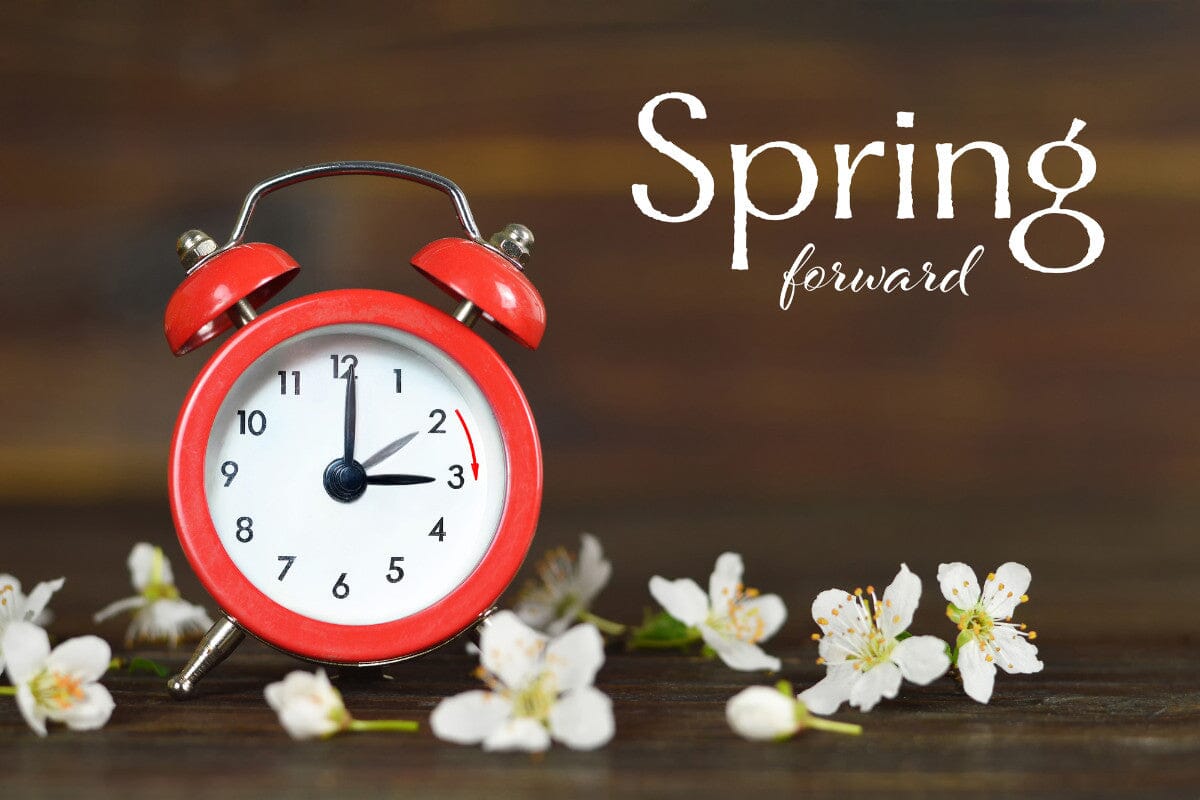Your Cart is Empty
FREE SHIPPING OVER $45 & FREE RETURNS ON ALL USA ORDERS | 365-DAY MONEY-BACK GUARANTEE
FREE SHIPPING OVER $45 & FREE RETURNS ON ALL USA ORDERS | 365-DAY MONEY-BACK GUARANTEE

Can you believe it's almost time to spring forward with Daylight Savings Time again? Yep, that magical moment when we lose an hour of precious sleep but gain a whole lot of daylight.
Now, if you're anything like me, you might be thinking, "Wait, didn't we just do this time dance?" Well, you're not alone in feeling like time is playing tricks on us. But fear not, my friends, because I've got some tips to help you navigate this annual time warp like a pro.
But before we dive into the nitty-gritty of surviving Daylight Savings Time, let's take a quick trip down memory lane and explore why this whole clock-shifting shenanigan even started in the first place.
Back in the day (and I mean way back, like the early 1900s), Daylight Savings Time was introduced as a way to make better use of natural daylight during the longer days of spring and summer.
You see, before electricity became widespread, people relied heavily on natural light to go about their daily lives. So, by shifting the clocks forward in the spring and back in the fall, folks could make the most of those extra daylight hours and save energy by reducing the need for artificial lighting.
Fast forward to today, and while our reliance on natural light might not be as critical as it once was, Daylight Savings Time still serves as a handy way to make the most of those longer, sunnier days. Plus, who doesn't love a little extra daylight to play with, am I right?
You see, our internal clocks (circadian rhythms) are like finely tuned machines that help regulate our sleep-wake cycles, hormone production, and other bodily functions. And when we mess with these internal clocks by springing forward or falling back, it can throw our whole system out of whack.
For starters, losing that hour of sleep can leave us feeling groggy, irritable, and just plain out of sorts. And if you're already dealing with health challenges like joint pain or muscle stiffness, this sleep disruption can sometimes exacerbate those symptoms.
But it's not just our sleep that can take a hit. Daylight Savings Time can also mess with our body's natural rhythms, leading to changes in appetite, energy levels, and even mood. And for some folks, this disruption can trigger flare-ups of conditions like gout or fibromyalgia, making an already challenging time of year feel even tougher.
So, what's a seasoned timer like you and me to do? Here are a few tricks I've picked up over the years to help ease the transition:
1. Ease into it: Start adjusting your bedtime and wake-up time gradually in the days leading up to Daylight Savings Time. This can help your body acclimate to the change without feeling like you've been hit by a time-traveling train.
2. Prioritize sleep: I can't stress this one enough. Make sure you're getting plenty of rest leading up to and following the time change. A well-rested body is better equipped to handle any curveballs that Daylight Savings Time might throw your way.
3. Stay hydrated: Hydration is key, my friends. Drink plenty of water throughout the day to keep your joints happy and your body functioning at its best.
4. Move your body: Gentle exercise can do wonders for easing joint and muscle discomfort. Take advantage of the extra daylight to go for a leisurely walk, do some gentle stretching, or maybe even bust a move to your favorite tunes. Just remember to listen to your body and take it easy if you need to.
5. Watch your diet: Certain foods, like those high in purines (looking at you, red meat and shellfish), can trigger gout flare-ups in some folks. Pay attention to what you're eating, especially during this time of transition, and try to opt for anti-inflammatory foods like fruits, veggies, and whole grains whenever possible.
Remember, Daylight Savings Time might throw us a curveball, but with a little preparation and a whole lot of self-care, we can breeze through it like the seasoned timers we are. So, here's to springing forward with confidence and embracing the extra daylight with open arms (and maybe a good cup of coffee)!
Let me know what topics you're interested in, and I'll do my best to include them in future blogs! Email me at info@toneshealth.com
Aaron Greenberg
March 12, 2024
great post !!!! thank you….I find this very helpful.